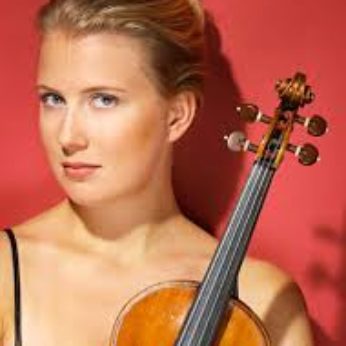Composer: Bohuslav Martinů (b. 1770 - d. 1827)
Performance date: 08/07/2016
Venue: Bantry Library
Composition Year: 1947
Duration: 00:17:14
Recording Engineer: Richard McCullough, RTÉ lyric fm
Instrumentation: vn, va, vc, pf
Instrumentation Category:Duo
Instrumentation Other: vn, va
Artists:
Elina Vähäla -
[violin]
Lilli Maijala -
[viola]

Martinu
was famously born in a church tower in a small town in the Czech highlands,
where he spent much of his childhood looking out at the world from afar. He
went to study violin at Prague Conservatory when he was only sixteen, but was a
hopeless student, more interested in composing than studying, eventually ending
in the third stand of the second violins of the Czech Philharmonic. In
September 1923 Martinu left Prague for Paris on what seemed at the time like a
small excursion, but he remained there for seventeen years until the fall of
France. In Paris he had been the proverbial poverty-struck Bohemian artist
living in a garret in Montmartre, where his room was just large enough to hold
a bed, a piano, a writing-table and a small stove and his evenings were just
long enough to spend with fellow-musicians at the Café du Dôme. But Paris in
1940 under German occupation was no place for a Left-Bank artist and, like many
before him, Martin? followed the arduous escape route via Marseille, Spain and
Portugal to the USA.
Unlike
many other émigré composers, Martinu settled down well in New York. He always
seemed to have influential friends and patronage by leading east coast musical
figures like Serge Koussevitzky helped him find his feet. The years 1942-6 saw
a flood of new works including five symphonies. A near-fatal accident in 1946
followed by the Soviet takeover of Czechoslovakia in 1948 put an end to his
plans to return to his homeland. He spent most of 1947 convalescing and
composing chamber music including this evening’s unusual combination.
The
best known works in the violin/viola combination are Mozart’s two Duos, which Martin?
heard performed by the brother-sister Fuchs Duo. This inspired him to compose
the three Madrigals, which can happily take their place alongside the Mozart.
The first Madrigal opens with infectious driving rhythms alternating with a
witty counterpoint and with two engaging themes that come together at the
close. The strange trills that open the Poco
Andante create a mood of nocturnal introspection in strong contrast to the
energetic Poco Allegro. Echoes of
country-dance music can occasionally be heard amongst the trills and this
gentle music gradually rises to a richly lyrical conclusion. The third Allegro Madrigal takes off in great
style and never lets up until the fervour is calmed by the central Moderato, where the two instruments
conduct a gentle dance that spirals into the trills from the Andante. The wild opening tempo returns
and the movement builds to a tremendous conclusion.
Copyright © 2025 West Cork Music. All rights reserved.
Designed and developed by Matrix Internet